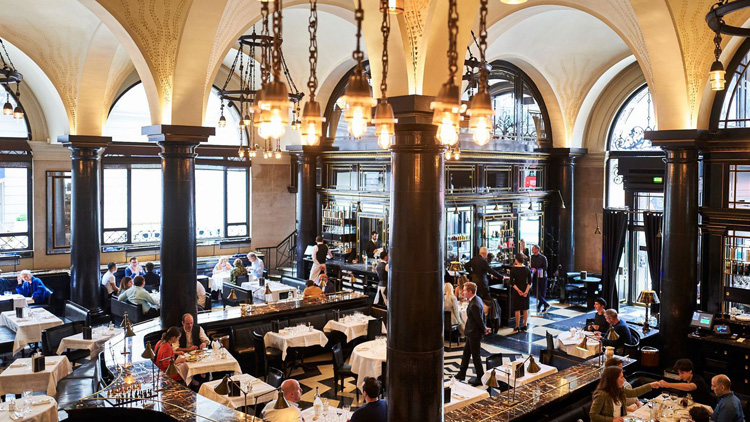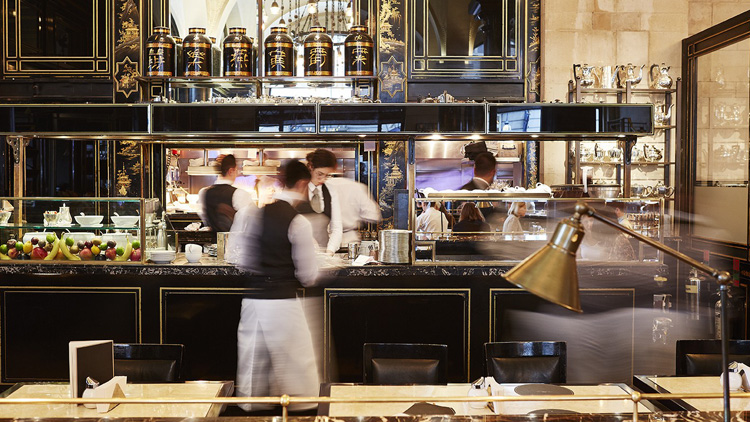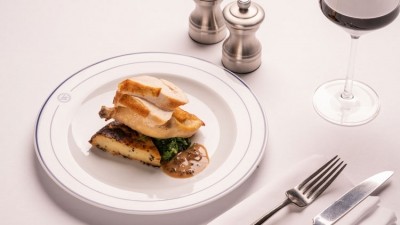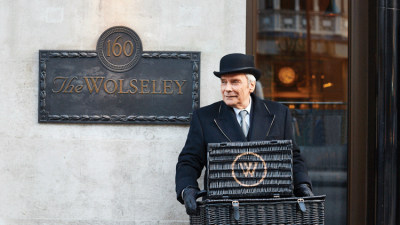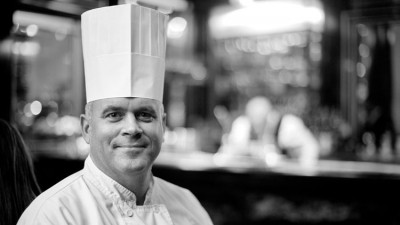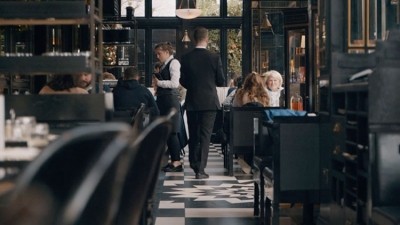“We’re not here to change the business model” - Minor on Corbin & King’s future
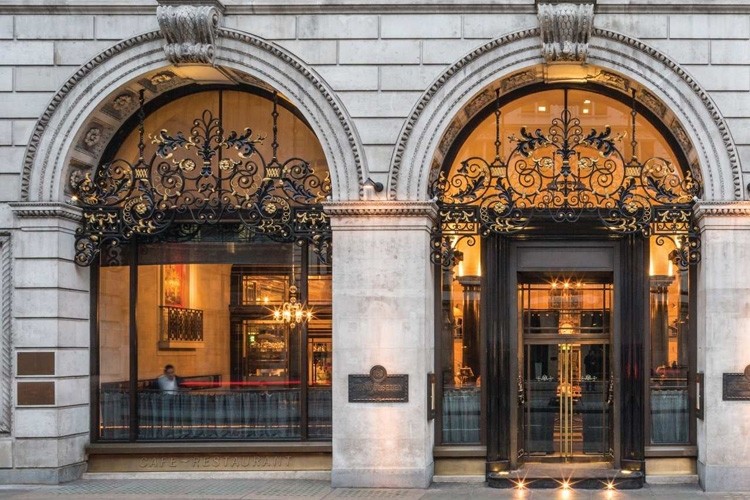
On one of the shelves in the board room of the Corbin & King offices, located above its flagship restaurant The Wolseley in London’s Piccadilly, sits a large, framed photograph of the group’s co-founder Jeremy King receiving his OBE from the Queen in 2014. It’s a happy image, one of bright colours and big smiles, but in the wake of recent events, its impact is more ethereal. For while King’s presence may still be felt across the restaurant estate that he and co-founder Chris Corbin built, which also includes Brasserie Zédel, Soutine and The Delaunay, his involvement is no more.
“It’s sad to see where we ended up,” says Dillip Rajakarier, group chief executive of Minor International, which acquired full control of Corbin & King earlier this month having held a majority stake in the group since 2017. The battle for the business, a prolonged and very public fight that culminated in the two parties bidding for ownership at an auction in early April, left many in the industry fearful for the future of group; concerns that have been far from assuaged by the outcome.
Rajakarier is aware of the perception many people have of the situation, and he’s out to put Minor’s side of the story on the record. “We never wanted to get into a bun fight in the public domain,” he says, reflecting on the situation. “In 2017, we came in as a hospitality investor because this is our core business. We’re not a private equity firm; and we’re not a distress fund that’s acquiring businesses, cutting costs and flipping them. Minor operates hotels and restaurants in 64 countries around the world, hospitality is central to what we do.”
In the days since Minor acquired the group, coverage in the mainstream press has primarily been split between lamentation over King’s departure and speculation about what its new owners have planned. Many have assumed Minor intends to pursue a mass rollout of Corbin & King’s different concepts; and across the sector, people have spoken of not wishing to visit the likes of Zédel and The Wolseley again, in solidarity with King.
“Of course, it’s disappointing,” says Rajakarier. “But my focus is on the 700 employees and team members. They’re the ones that have created this brand. They’re the ones that are passionate about the business and are trying to make each restaurant iconic. And I really hope that as more people get to know the real story, they will come out and support the team members of the business. It’s not about us as shareholders, it’s about them.
“Yes, it’s sudden news, but in the coming months our team members will be able to demonstrate that business is as usual at Corbin & King; the restaurants continue to thrive; and we’re not here to change anything.”
A fractious relationship
Rajakarier speaks graciously of King’s legacy. “To be fair, Jeremy is a fantastic restaurateur,” he says. “And that’s the reason we got into the joint venture.” But there’s no hiding that over the years the relationship between King and Minor had become increasingly fractious. The Guardian reports that both Corbin and King, the former having taken a step back from the business in recent years, are now banned from stepping foot inside any of the nine sites they opened – something that Rajakarier neither confirms nor denies.
Trying to pinpoint an exact moment when the relationship between King and Minor soured is difficult. What is clear is that it has been an acrimonious affair with claims and counter claims of blame on each side. In a video on YouTube that has since been removed King described the business as being “under siege” from Minor, refuting its claims that Corbin & King couldn’t meet its financial obligations.
“We never wanted to get into
a bun fight in the public domain”
Rajakarier responds, pointing towards a multi-million-pound loan he says Corbin & King defaulted on in 2020, which eventually led to Minor placing the group’s holding company into administration earlier this year.
“We didn’t call [the debt] until this year, we tried to make it work. Not only that, we said we’re happy to inject more cash into the business, but Jeremy had to give up some shareholder rights in return.”
A key area of frustration between the two parties, according to Rajakarier, was differences in the alignment of the vision, sustainability and commercial viability of the business, which was further exacerbated by Covid.
“We wanted to make sure we protect the business and come out of the pandemic stronger, and that included putting a hold on capital expenditure spending. But Jeremy wanted to keep going and open more restaurants. I told him: ‘it’s nice to say that, but you’re not investing a penny’. It was coming from us.”
Having now taken control of the business, Rajakarier says Minor can focus on securing its long-term sustainability. “That’s what it’s all about. As a public company we follow good corporate governance. We keep growing, keep investing in people and our assets, and building the estate, which we know is very iconic in London with some of the top restaurants that operate in that market segment. It’s an institution – not low end or high end, but it’s got a niche in the marketplace.”
Plans for the future
In the immediate future, Minor’s expansion will see it resume work on the three restaurants Corbin & King had signed for prior to the pandemic. They include a site on the former House of Fraser department store on King William Street in the City, which will open as a second iteration of The Wolseley; the long-awaited, pescatarian-focused restaurant Manzi's in Soho, which Rajakarier expects to open before the end of the year; and, finally, an as-yet unnamed restaurant in the old Royal Bank of Scotland building between Pembridge Road and Pembridge Gardens in Notting Hill.
“The Wolseley is seen as a unique brand in a niche segment
that doesn't have much competing with it,
and that’s how we want to keep it”
“There’s a short term, medium term and long-term plan,” he explains. “In the short term, it's all about stability. It's about creating that exceptional guest experience; investing in people; and investing in the assets.
“The medium term is fulfilling our obligations in terms of Manzi's and the other two [restaurants]. Long term, it's global expansion.”
While Rajakarier is open about Minor's aims to grow the Corbin & King estate internationally, with both The Wolseley and Colbert singled out as having potential legs for expansion, he dismisses suggestions that he wants to roll out the group's different concepts on a mass scale.
“Our intention is not to dilute any of the brands. Because we have invested in them and the people, the last thing we want to do is dilute that. Our intention is to work with the [management] team and come up with plan to see where we could take that some of the concepts, but also create new ones.
“For us, it’s all about the geography, the brand fit, and the customer segment. That’s what we take into account before we look at whether we have a Wolseley in New York, Hong Kong or the Middle East. And we will have to work with the team, as they will have to support the growth of the business. But our plan is not to go and roll out 300-500 sites globally. Today, The Wolseley is seen as a unique brand in a niche segment that doesn't have much competing with it, and that’s how we want to keep it.”
Keeping things the same
Throughout our conversation, Rajakarier is keen to reiterate that Minor doesn’t have grand plans to overhaul the group. Brasserie Zédel, perhaps the most idiosyncratic restaurant in the Corbin & King portfolio, will not see its popular two-course set menu for £13 disappear. “Everything stays the same,” he says. “Nothing changes. The management team is doing a fantastic job; we don’t want to change the concept, offering or experience.”
This extends to the name of the group too, which will remain Corbin & King despite the efforts Minor has gone through to remove them from the business; and the staff, with Rajakarier saying there are no plans for redundancies or changes to employment terms. Given the close relationship the staff shared with King, though, surely Minor will have its work cut out instilling the same sense of trust?
“What we have done is take our time to stabilise the business, and tell the team we’re here to support them now and in the long term; to keep the business alive, and also make it better as now we can start to invest.
“It’s not as if we don’t understand the business of hospitality. We run high-end luxury brands all over the world, we understand restaurants. We have many joint ventures in most countries and have been very successful over the years. And I hope that through demonstrating that the staff will be able to settle.”
While Minor’s ousting of King may have created some bad blood within the sector, it doesn’t seem to have affected the consumer appetite. On the afternoon we meet at The Wolseley, the restaurant is full of guests enjoying afternoon tea; the bustling front of house team delivering plate stands piled high with finger sandwiches, cakes, and fruit scones with homemade jam and clotted cream.
“I can’t even get a table reservation,” says Rajakarier, with a chuckle. The magic of what Corbin & King created remains very much alive in that dining room, and Minor appears determined to make sure it doesn’t break the spell.
“If you look at customer habits and expectations, they’re changing all the time, and we can support that through our network,” continues Rajakarier. “We’re not here to run [the business], the leadership team here know the customers much better than us; all we’re doing is giving them that support infrastructure and the logistics so they can better it. That extends to investment, in terms of both of people and assets; after the last two years, it’s been starved of capital expenditure.
“We’re not here to change the business model. It’s not broken, so why try to fix it.”

